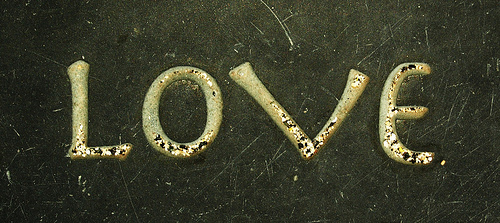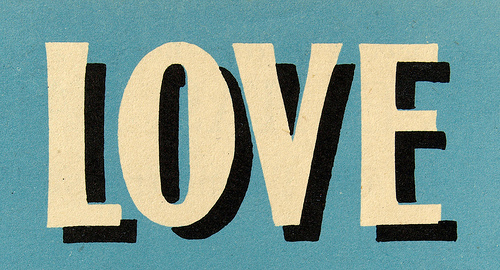
I am not a Christian, but I have no problem with placing love at the center of my religious ideology.
(That I should feel the need to qualify the centrality of love with an “I am not” statement is notable.)
When I check in with my desire, my deepest yearning, I discover love. It’s there, simple and quiet; steady and ready to be known.
The word, as many wiser people than I have observed, is overused in the English language. When I say “love” you might think of love as romance, adoration, longing, friendship or lust.
Do you love your car? Do you love your husband? Do you love your new phone? Do you love the land? The Gods? Yourself?
In each of these cases, the word is used quite differently. Isn’t it?

So what does it mean that my deepest yearning, my True Desire, is love?
I don’t know how to answer that question.
While I’m perfectly comfortable with writing that “love is at the center of my religious ideology,” I don’t know exactly what that means.
I was raised a Christian. I’ve written about that in many places. I also came into my own as a young adult within a Christian community. One could easily ascertain that my emphasis on love is a holdover from my earlier tradition. The Christians planted the love seed, and the tree continues to grow — even if it is decorated with Pagan symbols now.
Perhaps that is true. For certain, it is reductive.
I don’t think that Christians have the patent on love. It wasn’t born two thousand years ago, and it isn’t contained exclusively in the pages of the Good Book. It is bigger than any one tradition.

But how do we talk about love in a Pagan context? Can we place it at the center of our religious ideologies — or our spiritual practices, if that feels more comfortable to you — while retaining a sense of identity in our tradition.
For that matter, is it reasonable to expect that we do such a thing?
I’ve met people who seem to care little about love in a broad or theological sense, but a lot about love for their tribe. The boundaries are clear to them. You have it for some, but you don’t necessarily have it for others. There is an inside (where love is given), and there is an outside (from which you protect yourself).
And it’s not just Pagans or polytheists who do this. There are Christians who think of love in this way. There are Muslims who think of love in this way. There are people in every religious tradition who think of love as something that is given to only a few select people.
Tribalism is tribalism, no matter how you dress it up.
So, again, what does it mean that love is at the center of my religious ideology?
I still don’t know.
There are a few things that I am clear about:
- I care for people. I care about their well being. This care sometimes is experienced as love, and this love is given to people I know very well and people I don’t know well at all. I consider myself a servant of my community, and I have great love for those who I serve.
- I am in love with my husband. Madly. Over the past several weeks a new fire has ignited between us. Seven years we have been together, and somehow — amazingly — we are discovering each other in completely new ways. In him, I know love.
- I feel a profound sense of love when I do ritual. This love feels like it’s coming from something on the edges of myself, pouring inward. I felt this at the PantheaCon Morrígan ritual (which continues to work its way into my skin). I have felt it every time I performed a Solitary Druid Fellowship High Day ritual. Love — some primal, essential kind of love — is present with me in those moments.
So it’s interesting to me that I start off this post with a need to clarify how this centrality of love is not Christian. My disclaimer makes me aware that I haven’t had much cause (or opportunity) to talk much about love since I became a Pagan.
And why is that?
How is it that something that can be so intrinsic to me (and I presume to others) can be a subject that doesn’t come up much in my religious community? Is it that we don’t have a context for talking about love? Are we convinced that love wasn’t that important in the Old Ways, and — more importantly — are we satisfied with that conclusion?
Or, are we afraid that if we talk about love in connection with our religious lives that we might start sounding too Christian?
Where does love fit into Pagan and polytheist traditions?
Leave a Reply